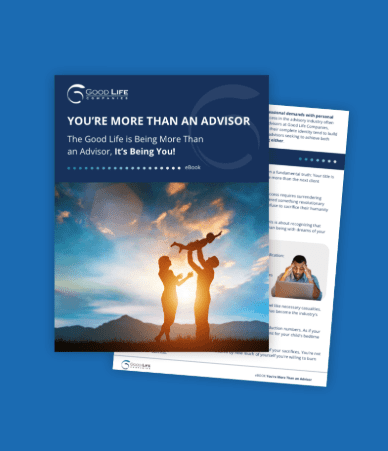There are few careers more rewarding than financial services. In addition to working in an extremely lucrative profession, financial advisors are blessed with the opportunity to help individuals and families build wealth, achieve stability, and retire comfortably.
Becoming a financial advisor is not easy. All good things in life require hard work. In this post, we’ll outline the financial advisor career path, the pros and cons of various entry-level positions, and your options once you’ve gained some experience. If you’ve been thinking of becoming an advisor, here’s what you need to know.
Good Life Companies is a leading independent financial advisor network offering a full suite of services and tools to transition and support independent advisors and insurance agents. Learn how we can help you establish and grow your business.
Education and Certification Requirements
The first step on the financial advisor career path is to enroll in a college or university and get a bachelor’s degree. For best results, major in business, finance, or accounting. This will give you the base knowledge you need to understand how financial markets work. Once you’ve earned your undergrad degree, do the following:
- Take the SIE Exam: You don’t need a sponsor to take the Securities Industry Essentials (SIE) exam, but a passing grade will demonstrate your knowledge and make it easier to find a sponsor for your Series 6, Series 7, or Series 57.
- Find a Series 7 Sponsor: Before you can take your next round of exams, you’ll need to find a financial services company to sponsor you. This is mandatory for any of the Series exams listed above. Push for the Series 7, as it gives you the broadest range of options. The Series 6 limits you to only packaged securities, like mutual funds and annuities. The Series 7 is a license to also sell individual stocks, bonds, options, and futures.
- Take the Series 66: If you hold a Series 7 license, you no longer have to choose between the Series 63 and Series 65. The Series 66 was developed by the North American Securities Administrators Association (NASAA) to eliminate redundancies in other exams. A combination of Series 66 and Series 7 will license you in all fifty states.
There are other paths you can take, but the three steps listed above are the preferred combination for anyone who wants to be a full-service financial advisor. For additional information, read our blog on Financial Advisor License Requirements.
Getting Your First Job as a Financial Advisor
Since your Series 7 licensing required a sponsor and job experience, you’ve already gotten your feet wet in the industry. There may be an opportunity to work at your sponsor firm, or you may want to consider one of the following entry level options:
- Junior Advisor at Larger Firm: Most newbies start out as a portfolio analyst. Taking this role at a larger firm will give you an opportunity to learn from the ground up. No one is going to allow you to manage money directly when you first start out, but you’ll get there. The drawback with larger firms is that it might take longer for you to do that.
- Position at a Smaller Firm: Working in an entry-level position at a smaller firm should give you an opportunity to move up faster. There’s a trade-off, though. Smaller firms don’t typically offer the same level of job security or educational benefits that you might find at one of the larger RIAs or broker dealers.
- Other Positions: Financial advisors don’t always begin their careers with advisory firms. Management consulting, insurance, investment banking, and even real estate sales are all valid points of entry into financial services. Starting out with one of these could lead to specialization as an independent financial advisor later down the road.
Continued Education for Financial Advisors
When a student completes their undergrad, they go to graduate school. Financial advisors can do that, but they also have options for continued education that are not available in other professions. With increased competition, many are opting to continue their education and earn one of the following:
- Certified Financial Planner (CFP): One of the most distinctive achievements for financial advisors, acquiring a CFP requires the completion of a CFP Board-certified education program, passing a written exam, and working 6000 hours as a financial planner.
- Chartered Financial Analyst (CFA): Advisors who prefer corporate financial analysis over personal financial planning will often pursue a CFA certification. This requires four years’ experience in the industry and passing grades on three exams, CFA Levels I, II, and III.
- Certified Public Accountant (CPA): To sit for the CPA exam, a candidate is required to have a bachelor’s degree in accounting or the equivalent in accounting credits added to a non-accounting degree. There’s no work requirement to take the exam, but most states do have a work requirement before they’ll issue a state license.
Each of these designations requires a background check and continued education credits (CE) to maintain your license. They also give the recipient legal permission to use the certification initials as part of their professional identity, a competitive advantage for financial advisors.
Consider Becoming an Independent Advisor
For those of you who have already been through all this and want to break away from the corporate umbrella at a broker dealer or investment bank, another option on the financial advisor career path is to become an independent advisor. Becoming an independent advisor allows you to:
- Be Your Own Boss. You can finally be your own boss and build a business with your vision.
- Enjoy Product Flexibility. You can offer both commission-based services and fee-based services.
- Increase Revenue. You can set your own rates and can raise as needed while taking on as many new clients as you’d like.
Good Life Companies is an independent financial advisor network with a full suite of services and tools to help you make the transition to independence. To learn more about how we can help you establish and grow your practice, contact us today.








